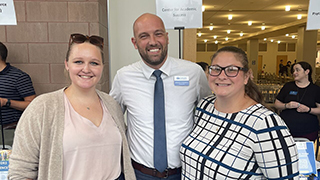Professors Collaborate with Two Diplomacy Students to Publish a Book Chapter - Seton Hall University
Thursday, May 26, 2022

This chapter seeks to highlight the importance of liaison engagement with prominent Black student leaders at Seton Hall University and addresses the librarian support provided to aid their endeavors. The content within this chapter, co-authored by Dia Bolton, '22, and Akaysha Palmer, '22, two Black student organization presidents and two Africana Studies liaison librarians, Professors Chelsea Barrett and Brooke Duffy, expands on the various activities and initiatives that several interconnected student groups organized and the mechanisms with which librarians were actively involved in supporting them.
Akaysha Palmer says about her experience, "When Professors Chelsea Barrett and Brooke Duffy reached out to me about co-authoring a book chapter with them I was surprised at the idea, yet grateful for the opportunity. As a Black student leader, having a strong presence at a predominantly white university has allowed me to create organizations that support other students of color while connecting with student leaders. This has made my experience here rewarding and invaluable, and I hope that expressing the importance of diversity, inclusion, and leadership in this book chapter inspires other leaders and students around the United States."
Ethnic Studies in Academic and Research Libraries, where the chapter is published, serves as a snapshot of critical work that library staff are doing to support ethnic studies, including areas focusing on ethnic and racial experiences across the disciplines. Other curriculums or programs may emphasize race, migration, and diasporic studies, and these intersecting areas are highlighted to ensure work supporting ethnic studies is not solely defined by a discipline, but by commitment to programs that uplift underserved and underrepresented ethnic communities and communities of color.
The publication is available at over 130 institutions according to WorldCat.
Categories: Campus Life, Education






